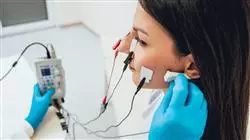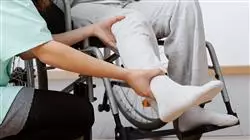University certificate
The world's largest faculty of nursing”
Introduction to the Program
Master the specific care required by neurological patients with cognitive impairment or muscular atrophy and diagnose the protocol to be followed with confidence thanks to this TECH qualification"

The program in Neuromuscular Diseases, Dementias and Headaches for Nursing presents in depth, on the one hand, dementias and cognitive impairment, clinical syndromes that lead to a progressive loss of autonomy that has a very negative influence on the performance of basic activities of daily living. As life expectancy increases, cases of dementia increase exponentially. Statistics confirm that dementia is the main cause of disability and dependence in the elderly.For this reason, the program addresses in particular Alzheimer's disease, which is the most frequent cause of dementia (between 60% and 80%). Thus, it addresses the etiopathogenesis of the main dementias, their classification and the importance of the nursing role in the diagnosis and treatment of neuropsychiatric symptoms.
It also includes an exhaustive study of headaches and migraines. Headaches are one of the most common ailments that exist. In fact, 90% of the population has suffered headaches in the last year, so it is necessary to delve into the differences between headaches and migraines, as the latter usually have an influence on the performance of basic activities of daily life of the person, affecting a high percentage of young people (12-13%).
This program also updates knowledge on the latest treatments, both pharmacological and surgical, and will emphasize the importance of having highly trained nurses specialized in the management of headaches. It should be noted that in recent years new treatments have been developed to help alleviate the acute pain they produce in patients who suffer from them. The etiopathogenesis of neuromuscular diseases, which are those that cause problems in the nerves that control the muscular system, is also considered. They usually cause atrophy, contractions and muscle pain. Therefore, the most common disorders, such as amyotrophic lateral sclerosis, myasthenia gravis and muscular dystrophy, will be described. At the same time, this University Expert will provide knowledge on the most advanced and current treatments in this area; although it is true that these diseases usually have no cure, the treatments improve the symptomatology, and increase both mobility and life expectancy, with nursing playing a crucial role in the management of these diseases.
You will delve into the most up-to-date treatments and specific nursing care that differentiate headache from migraine with great success"
This Postgraduate diploma in Neuromuscular Diseases, Dementias and Headaches for Nursing contains the most complete and up-to-date scientific program on the market. The most important features of the program include:
- Development of more than 100 case studies presented by experts in neurological nursing. Its graphic, schematic and eminently practical contents, which are designed to provide essential scientific and assistance information for professional practice
- Latest developments in neurological nursing
- Contains practical exercises
- Theoretical lessons, questions to the expert and clinical cases for individual reflection
- Content that is accessible from any fixed or portable device with an Internet connection
- Multimedia content developed with the latest educational technology, which will allow the professional a situated and contextual learning, i.e. a simulated environment that will provide an immersive learning programmed to train in real situations
You will perform as a specialist standardized care plans after having acquired the knowledge on how to perform nursing assessments according to functional patterns, using NANDA-NIC-NOC nursing taxonomy for care planning and evaluation"
The program’s teaching staff includes professionals from the sector who contribute their work experience to this training program, as well as renowned specialists from leading societies and prestigious universities.
The multimedia content, developed with the latest educational technology, will provide the professional with situated and contextual learning, i.e., a simulated environment that will provide immersive training programmed to train in real situations.
This program is designed around Problem-Based Learning, whereby the professional must try to solve the different professional practice situations that arise during the academic year. For this purpose, the professional will be assisted by an innovative interactive video system created by renowned and experienced experts.
Acquiring knowledge and fundamentals of the pathophysiology of neuromuscular diseases and integrating them into nursing practice is possible thanks to this TECH Postgraduate Diploma.

With this Postgraduate diploma you will acquire the necessary knowledge in physiopathology of neurological diseases, something highly demanded by experts in the sector"
Why study at TECH?
TECH is the world’s largest online university. With an impressive catalog of more than 14,000 university programs available in 11 languages, it is positioned as a leader in employability, with a 99% job placement rate. In addition, it relies on an enormous faculty of more than 6,000 professors of the highest international renown.

Study at the world's largest online university and guarantee your professional success. The future starts at TECH”
The world’s best online university according to FORBES
The prestigious Forbes magazine, specialized in business and finance, has highlighted TECH as “the world's best online university” This is what they have recently stated in an article in their digital edition in which they echo the success story of this institution, “thanks to the academic offer it provides, the selection of its teaching staff, and an innovative learning method aimed at educating the professionals of the future”
A revolutionary study method, a cutting-edge faculty and a practical focus: the key to TECH's success.
The most complete study plans on the university scene
TECH offers the most complete study plans on the university scene, with syllabuses that cover fundamental concepts and, at the same time, the main scientific advances in their specific scientific areas. In addition, these programs are continuously being updated to guarantee students the academic vanguard and the most in-demand professional skills. In this way, the university's qualifications provide its graduates with a significant advantage to propel their careers to success.
TECH offers the most comprehensive and intensive study plans on the current university scene.
A world-class teaching staff
TECH's teaching staff is made up of more than 6,000 professors with the highest international recognition. Professors, researchers and top executives of multinational companies, including Isaiah Covington, performance coach of the Boston Celtics; Magda Romanska, principal investigator at Harvard MetaLAB; Ignacio Wistumba, chairman of the department of translational molecular pathology at MD Anderson Cancer Center; and D.W. Pine, creative director of TIME magazine, among others.
Internationally renowned experts, specialized in different branches of Health, Technology, Communication and Business, form part of the TECH faculty.
A unique learning method
TECH is the first university to use Relearning in all its programs. It is the best online learning methodology, accredited with international teaching quality certifications, provided by prestigious educational agencies. In addition, this disruptive educational model is complemented with the “Case Method”, thereby setting up a unique online teaching strategy. Innovative teaching resources are also implemented, including detailed videos, infographics and interactive summaries.
TECH combines Relearning and the Case Method in all its university programs to guarantee excellent theoretical and practical learning, studying whenever and wherever you want.
The world's largest online university
TECH is the world’s largest online university. We are the largest educational institution, with the best and widest online educational catalog, one hundred percent online and covering the vast majority of areas of knowledge. We offer a large selection of our own degrees and accredited online undergraduate and postgraduate degrees. In total, more than 14,000 university degrees, in eleven different languages, make us the largest educational largest in the world.
TECH has the world's most extensive catalog of academic and official programs, available in more than 11 languages.
Google Premier Partner
The American technology giant has awarded TECH the Google Google Premier Partner badge. This award, which is only available to 3% of the world's companies, highlights the efficient, flexible and tailored experience that this university provides to students. The recognition as a Google Premier Partner not only accredits the maximum rigor, performance and investment in TECH's digital infrastructures, but also places this university as one of the world's leading technology companies.
Google has positioned TECH in the top 3% of the world's most important technology companies by awarding it its Google Premier Partner badge.
The official online university of the NBA
TECH is the official online university of the NBA. Thanks to our agreement with the biggest league in basketball, we offer our students exclusive university programs, as well as a wide variety of educational resources focused on the business of the league and other areas of the sports industry. Each program is made up of a uniquely designed syllabus and features exceptional guest hosts: professionals with a distinguished sports background who will offer their expertise on the most relevant topics.
TECH has been selected by the NBA, the world's top basketball league, as its official online university.
The top-rated university by its students
Students have positioned TECH as the world's top-rated university on the main review websites, with a highest rating of 4.9 out of 5, obtained from more than 1,000 reviews. These results consolidate TECH as the benchmark university institution at an international level, reflecting the excellence and positive impact of its educational model.” reflecting the excellence and positive impact of its educational model.”
TECH is the world’s top-rated university by its students.
Leaders in employability
TECH has managed to become the leading university in employability. 99% of its students obtain jobs in the academic field they have studied, within one year of completing any of the university's programs. A similar number achieve immediate career enhancement. All this thanks to a study methodology that bases its effectiveness on the acquisition of practical skills, which are absolutely necessary for professional development.
99% of TECH graduates find a job within a year of completing their studies.
Postgraduate Diploma in Neuromuscular Diseases, Dementias and Headaches for Nursing
Caring for patients with neuromuscular diseases, dementias and headaches represents a constant challenge for Nursing professionals. The constant evolution of technology and medicine means that these professionals must continually update themselves to provide quality care. Therefore, at TECH Global University we have designed a Postgraduate Diploma in Neuromuscular Diseases, Dementias and Headaches for Nursing. The postgraduate course is taught online and has an innovative educational scheme that will provide you with the latest tools. In addition, our methodology includes the analysis of numerous case studies, which will reinforce your competencies in a dynamic and efficient way. The contents proposed in the curriculum range from the care and management of patients with neuromuscular diseases, dementias and headaches, to the study of the neurobiological bases that cause them, current treatments and the latest advances in research.
Excel in the care of patients with neuromuscular diseases, dementias and headaches.
If one of your professional goals is to provide specialized and quality care to patients suffering from neuromuscular diseases, dementias and headaches, this TECH program is definitely your best option. Through our postgraduate program, you will have access to an innovative relearning methodology and online lessons available 24 hours a day. In the contents of the syllabus, you will find approaches ranging from diagnosis and treatment of neuromuscular diseases, to comprehensive care in patients with dementia, evaluation and treatment of headaches. In addition, you will delve into the importance of effective communication with the patient and family, emotional management in crisis situations and teamwork. All this, with the aim that you can develop as a competent professional, able to provide excellent care in these areas.







